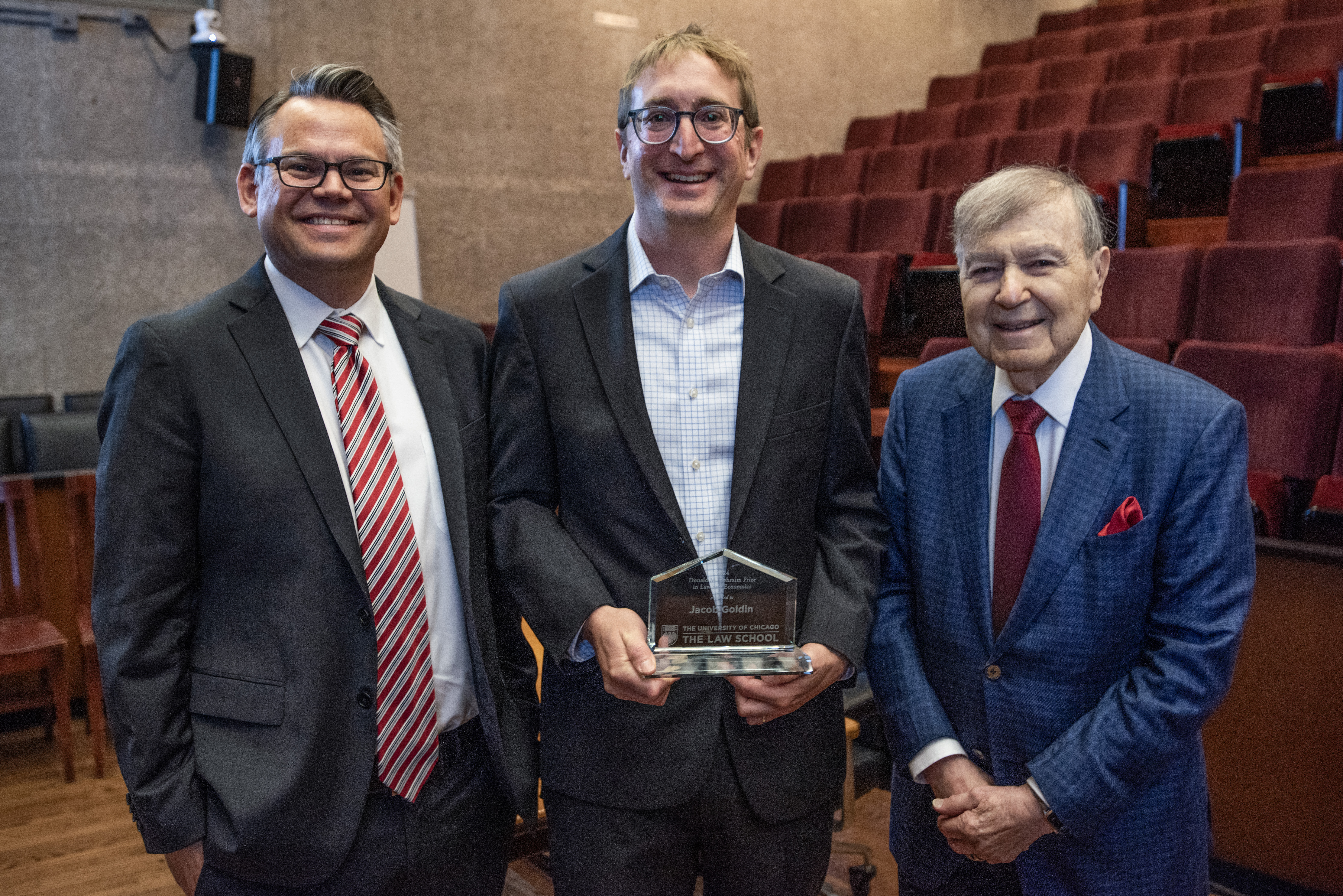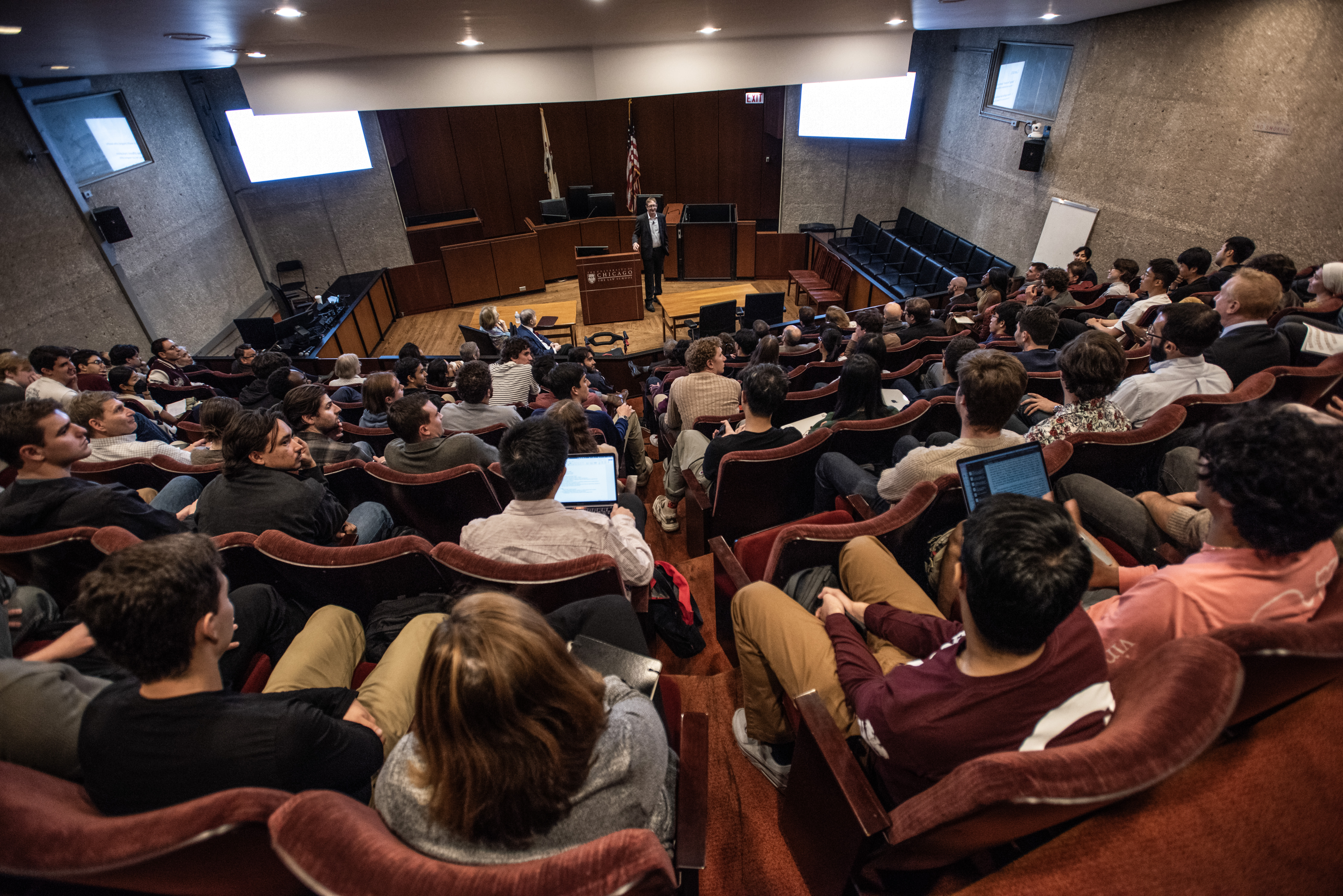Jacob Goldin Explores “What Counts as Income” in Second Annual Ephraim Lecture

The Donald M. Ephraim Lecture on Law and Economics, featuring Professor Jacob Goldin, kicked off the Law School’s 2024-2025 Named Lecture Series in early October, drawing a fully packed auditorium of students, faculty, and staff.
Goldin, the Richard M. Lipton Professor of Tax Law, is the 2024 recipient of the Donald M. Ephraim Prize in Law and Economics, which recognizes an early-career scholar in the area of law and economics whose work has advanced the state of knowledge in the field and whose intellectual impact has the potential to reach the legal academy and beyond. The Law School established the prize in 2023 with the generous support of Donald M. Ephraim, ’55, who attended the second annual event.
“Instead of other prizes that wait until the end of someone’s career, this early-career prize is meant to tell the world that this is someone you should pay attention to, someone you should listen to,” said Dean Adam Chilton in his introductory remarks. “The vision was to create that kind of forward-looking prize—where the person has a range of contributions ahead of them—and have it based here at the University of Chicago, the home of law and economics.”
A tax expert focused on tax policy and behavioral law and economics, Goldin, who joined the Law School three years ago, is certainly, as Chilton put it, someone to “pay attention to.” Goldin has already made important contributions to the field through his research that combines experimental methods, empirical methods, and a range of techniques to study the way taxes and redistribution systems could improve life for Americans, especially those at the lowest end of the financial spectrum, Chilton said.
One of Goldin’s projects particularly worthy of note is his research on the benefits of health insurance, where he explored whether expanding insurance through the Affordable Care Act, known as Obamacare, improved healthcare outcomes (his research concluded that the access did reduce mortality rates). Another impactful project involved studying IRS audit rates where he showed a massive discrepancy in audit rates between Black and White Americans.
“Both of these projects had immediate policy implications and showed the potential of law and economics to contribute to these kinds of debates,” said Chilton.
Ephraim delivered brief remarks in which he thanked former dean Thomas J. Miles, the Clifton R. Musser Professor of Law and Economics, for helping to establish the prize and the named lecture that features the awardee and also thanked Dean Chilton for continuing the new tradition.
Goldin’s 2025 Ephraim Lecture, “What Counts as Income? Economic Lessons for Defining the Income Tax Base,” was an exploration of some of Goldin’s latest ideas that he said he hoped would prompt discussion. “These are ideas that hopefully will become papers, or, maybe not, depending on the comments today,” he quipped.
In his lecture, Goldin outlined three economic principles, applying them to several thought experiments on how to appropriately define the income tax. He laid the groundwork for his talk by first reviewing what counts as income and what doesn’t count as income under the Haig-Simons definition, which states that income is the sum of what you spend on your consumption plus what you save, essentially measuring changes in one’s economic purchasing power.
“For many purposes, the downside of the Haig-Simons income approach is that it’s not tied to individual well-being,” said Goldin. “A better way we should be thinking about what counts as income is to think about the effect of one definition versus another on the welfare of individuals. That’s a more functional definition of income.”
The three basic principles Goldin argued should inform the choice of income tax base were:
- Taxes should be taxed based on marginal utility of income, which measures the degree to which a person is made better off from an extra dollar;
- How taxes change people’s behavior and spending choices; and
- The idea that at times your behavior as a consumer affects other people, not just yourself.
One of the hypotheticals that Goldin explored within the framework of these principles was a person who owns an asset that goes up in value but doesn’t sell that asset. Should this unrealized appreciation count as income?
“Lots of the policy debates are about whether we should try to tax this unrealized appreciation,” Goldin said.
He challenged the audience to contemplate this idea further by adding a variant to this example. What if, he said, the asset in question is a painting that is of great sentimental value to its owner, who would not sell it for less than a thousand dollars, when at the same time the price that it could be sold for is much less. What if, Goldin posited, this painting’s market value increased from $10 to $50 during a year. Should this increase count as income?
“There’s an economic argument that you wouldn’t have income in this instance,” said Goldin. “Whether the painting is worth $10 or $50, the market price is still much below the point where the person would be willing to sell it, so effectively, the increase in market price won’t have a meaningful effect on the person’s well-being or on their marginal utility of income.”
Exploring several other thought experiments throughout his talk, Goldin argued that the Haig-Simons definition of income can sometimes clash with the definition of income suggested by the simple economic principles he spelled out.
Goldin is the second individual to deliver an Ephraim Prize Lecture at the Law School. Megan T. Stevenson, Associate Professor of Law and Associate Professor of Economics at the University of Virginia delivered the inaugural lecture in November 2024.


